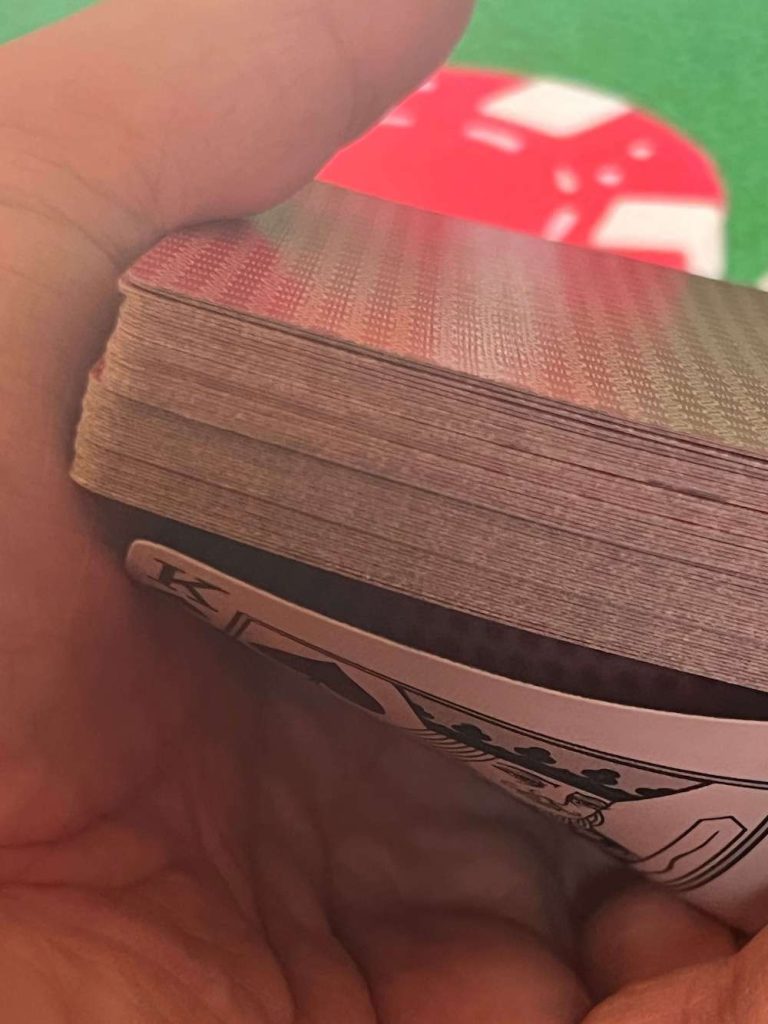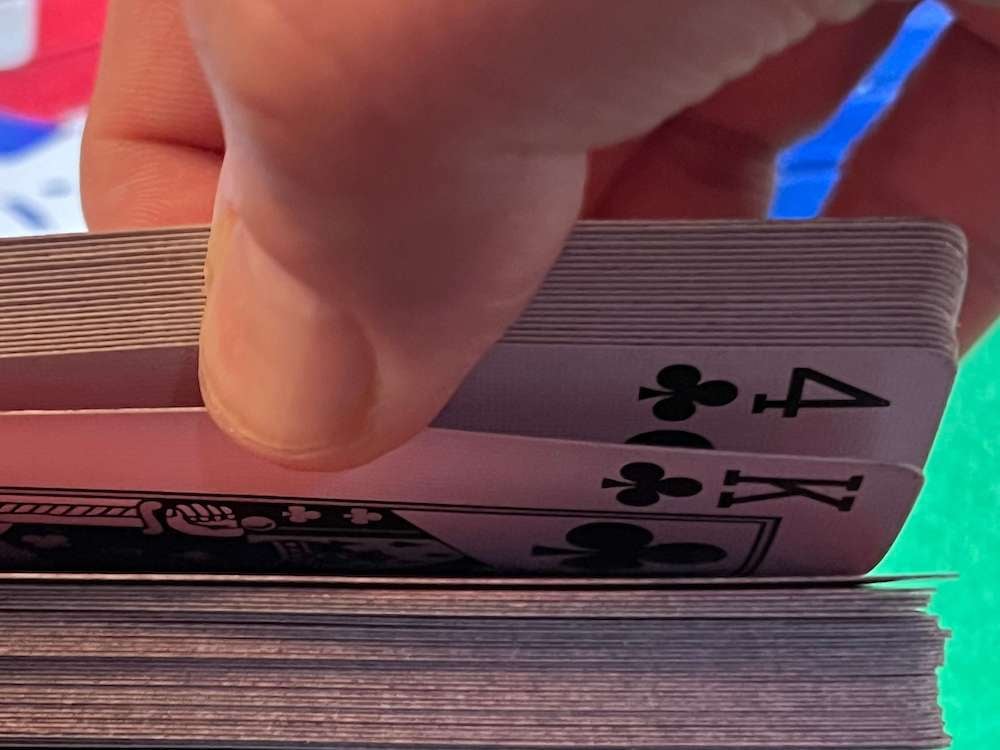In this article, we’re going to explore one of the most powerful sleights available to crooked poker dealers or croupiers.
Knowing just a single card can provide an unbeatable advantage; there are dozens of methods to get a glimpse of a card and in the hands of expert players, a simple peek can reap enormous rewards.
Secret Knowledge
I’m always suspicious when casinos use technology to know the order of a deck they’re about to deal and past systems that used cameras and computers in conjunction with automatic shufflers were subject to all kinds of shenanigans if the casino or developers were so inclined to make adjustments to how those machines worked.
I’ll get into the problems and possibilities of this kind of scenario another time but just having information that could lead to an unfair advantage is dangerous if it can inform or change game procedure.
The way I like to put it to my friends on the other side of table is: If players are not permitted to know what cards are about to be dealt, why should the house have that information?
Knowing what card is about to be dealt could make an enormous difference to a player sitting at first base on a blackjack table who knows for certain that the first card out of the shoe will be an ace.
Equally, if a machine were to change its procedure according to the order of the deck, this could give the house an unfair advantage against the players.
Shuffling and dealing procedures are so important to protect everybody from everybody else and one of the key considerations when shuffling or dealing cards in a gambling situation is to ensure none of cards are accidentally or deliberately revealed.
Imagine sitting at a table while a dealer shuffles eight decks by hand, then knowing exactly what the first 10 or 12 cards are going to be. Or playing Texas Hold ‘Em and knowing whether or not you’re about to hit the flop.
How big an advantage would you have if you could deal a good card to yourself and a bad card to your opponent?
All of this without the aid of a marked deck.
The following examples presume a crooked dealer (a mechanic) working with one or more players against the balance of the table but these same moves can be used in many situations including when a cheater is working “single-o”.
From Bubbles To Greeks
The following dealer peeks are used to either gain information that could be used against other players or in conjunction with a second deal to manipulate cards into the perfect position; here we’ll look at some of the most common (and most effective) methods to get that glimpse.
The heel or “Greek Peek” is used as the dealer gestures with the left hand, which is holding the deck.
The top card is lifted at the inner left side by pressure exerted from the base of the left thumb.
There is a distinct knack to this that takes a while to accomplish but once the muscle is trained and the action reduced to a minimum, it’s possible to make multiple peeks as cards are dealt from the top of the deck.
Continuous glimpses while dealing is truly limited to a handful of experts who both know the secret and have dedicated hundreds of hours to perfecting it.
Yet the easier, single peek has proven more dangerous to players and casinos, whether used by crooked dealers to avoid busting a partner’s hand or by bust-out dealers (in the bad old days) to make sure they killed a player’s hand!
The “Bubble Peek” is more appropriate for games where the dealer is required to necktie or guard their hand when not dealing, which both protects cards from some moves but makes them more vulnerable to others.
The Bubble is so called because the left thumb pushes the top card to the right against the tips of the left finger, which prevents the card from moving and forcing the card to buckle at the outer right corner, exposing the card’s index if the deck is held at the right angle (perfectly aided by many casinos’ dealing procedure).
This is an excellent way to peek a card, but care must be taken not to leave a distinct bend in the card and the peek happens in an instant, the “Bubble” popping up and down in just a fraction of a second.
Variations on the Bubble Peek bend the cards in different directions depending on game procedure and a particularly subtle version only bends the back of the card just enough to see if the dealer has a “paint” on top (a court card), which can be more than enough information.
Left-handed dealers have their own methods for these peeks since they tend to deal from the right hand and the techniques just described would only reveal a blank corner!
Down Into The Deck
Similar moves exist to peek the bottom of the deck with the cards being slightly buckled as they’re picked up, allowing a glimpse of the bottom inside index.
Another glimpse requires the bottom card to be squeezed backwards, buckling it until the dealer can see the index; this may seem crude but performed correctly it is completely invisible to everyone but the crooked dealer.

More advanced sleights allow the dealer to catch a glimpse of any card near the top or even a card in the middle.
Players can also glimpse cards during common table procedures with a particularly devious glimpse happening under cover of a cut.
In a loose game (in terms of procedure), when the dealer passes the deck, the cheating player cuts with two hands, estimating enough cards from the bottom for all the players plus one or two more.
If the bottom card is glimpsed before the cut, the player now knows a card that’s sure to hit the flop!
The danger with such a move is the bottom glimpse (which is hard to take when other players may be watching the cut), but there’s a little-known secret called the “Shutter Peek” where the top card is lifted at the inner end as the bottom half of the deck is being slapped on top of it.

Performed correctly, the previous top card is lifted at the very instant it becomes buried under the bottom half and is only exposed for a fraction of a second.
So long as the number of cards placed on top allow for all the players plus a burn card, the glimpsed card is sure to reappear with the community cards.
The “shutter” is a fantastic move and knowing one card that’s coming in the flop is a powerful advantage but games that allow players to cut – especially with two hands – are much rarer these days.
Deeper Deceptions
These are just a handful of the most powerful and common ways to peek cards before they are dealt but when a crooked dealer is working in cahoots with players there are many more sophisticated strategies that can beat almost any game.
These methods have stolen millions from casino table games and even more from players in private games.
In my next article, I’ll discuss how these simple peeks evolved to create an unbeatable advantage.
Lead image: Shutterstock